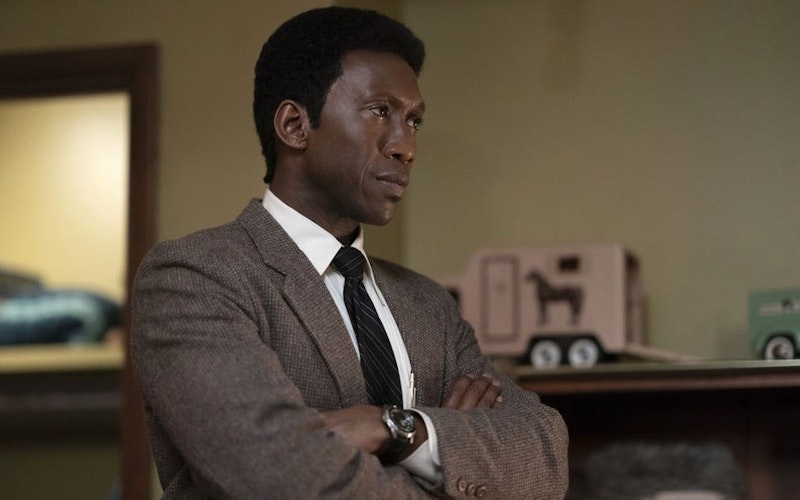
TV
Learning and Unlearning in True Detective
Mystery stories need to have gaps—spaces where viewers can play detective and piece together clues alongside the onscreen investigators.
HBO’s anthology series True Detective has always played with this convention, but its current third season ties those gaps into its theme and narrative. Starring Mahershala Ali as Detective Wayne Hays, the season traces a missing child investigation across three timelines: days after the crime in 1980, the reopening of the case in 1990, and a senile Hays’ recollections in 2015.
The structure invites viewers to posit theories, while continually reminding us that we actually know very little. The 2015 narrative might give us information still hidden from the 1980 or 1990 versions of the characters, but we also have to contend with the secrets Hays refuses to acknowledge and with his crumbling memory.
In the season’s fifth episode, written and directed by series creator Nick Pizzolatto, a sequence set in the 1990s begins with Hays and his wife Amelia (Carmen Ejogo) arguing about the true crime novel she’s writing. The fight ends when their young children arrive, reminding them to never say goodnight without also saying, “I love you.” Their commitment renewed, the family gathers together in the parents’ bed while Amelia reads a story.
Dissolving from Amelia and Hays’ intertwined hands, the camera transitions to an image of the confused, elderly Hays stumbling through dark hallways in 2015, where he asks empty rooms, “Where’s my family?” Through his bedroom’s open door, the 2015 Hays sees his 1990 self snuggling with his wife and children, listening to Amelia read. Contentment drops from the younger Hays’ face when he notices his older self lingering outside—and then his 1980 self staring through the window, shirt still stained with blood from a recent shootout.
In that moment, the 2015 Hays knows what he forgot in 1990: that his family loves him, that he needs Amelia’s perspective. Hays learns what he’s lost and unlearns what he thought he knew, receiving instead a fuller understanding of who he is. No longer just a cop on a case, he sees himself as a person with a history, a person with ties to other people. And we viewers do the same thing while we watch the show, learning details about the story that need to be unlearned with each new revelation.
Hays learns what he’s lost and unlearns what he thought he knew.
According to pastor Brian Zahnd, every Christian must endure a similar process of learning and unlearning. Interestingly, Zahnd illustrates his point with a missing child narrative. In Luke 2, Jesus’ parents lose their young son. When his frantic mother Mary finally finds him, Jesus asks her, “Why were you searching for me? Didn’t you know I had to be in my father’s house?”
Zahnd relates Mary’s experience to that of every Christian. Like Mary, we all create an idea of Jesus, an idea that we find “reliable and trustworthy.” But as God, Jesus always supersedes our understanding of him. We too easily mistake comfort with our perception of Jesus for intimacy with him, worshiping an idea instead of the living, moving God. When Jesus reveals his difference from that concept, it can feel like he’s disappeared. Like Mary, we look to find Jesus where he’s always been, doing what we expect Jesus to always be doing, and discover him instead “inexplicably absent.”
For Zahnd, losing Jesus is not a spiritual failure, but a spiritual practice, a necessary part of discipleship. We may think we’ve “got Jesus figured out,” but that’s when we lose him. It’s not the actual Jesus we lose, however, just our idea of him. And we can always find him again. It’s just that the Jesus we find is never the Jesus we knew. It’s a richer Jesus, a more complex Jesus, greater than we could previously comprehend. When we lose our version of Jesus, only to find a different and more challenging version, that’s “when the rethinking (repenting) starts,” Zahnd writes. “It’s the only way we make spiritual progress.”
Mystery shows can make us feel smart, as if we see all the angles. That might be fun for Saturday night Law & Order binges, but it’s a bad way to approach our faith. With its beguiling structure and narrative gaps, True Detective reminds us that our learning is always contingent, and our unlearning can lead to richer understanding.
Topics: TV